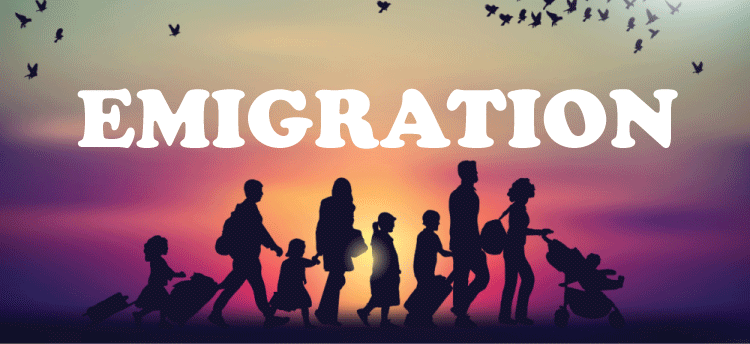Difference Between Immigration and Emigration
Immigration
Immigration is used when moving to another nation to reside permanently or temporarily. Individuals may go abroad for various reasons, such as job opportunities, political stability, family reunion, or to escape harassment. Immigration is a complicated, multifaceted problem that has gotten more political in recent years. It has positive and negative consequences on sending and receiving countries. It has played a significant role in human history and continues to influence the world's environment.

Historical Context
Immigration has been a fundamental aspect of human history, dating back to ancient times. The earliest known examples of immigration occurred during prehistoric times, as humans migrated from Africa to other parts of the world in search of food, water, and other resources. Throughout history, various causes, such as economic opportunities, political unrest, and natural calamities, have influenced immigration. For instance, millions of Europeans moved to America in the 19th century for better living and job possibilities. Comparable numbers of immigrants came to established nations like the United States, Canada, and Australia during the 20th century from developing countries in Asia, Africa, and South America.
Social and political causes, including war, imprisonment, and discrimination, have also influenced immigration. For instance, in search of safety and security during the second world war, numerous Jews escaped Nazi Germany and relocated to other nations. Comparable citizens from communist countries like Cuba and Vietnam migrated to the United States and other Western nations during the Cold War for freedom and democracy.
In conclusion, immigration has been a fundamental aspect of human history, driven by various economic, political, and social factors. It has had a significant impact on the development of many countries, both positive and negative, and continues to be an important issue in the modern world
Advantages of Immigration
- Immigration can benefit the host nation and the immigrants themselves in several ways. The ability of immigration to boost the host nation's economy is one of the key benefits of immigration.
- Introducing diversity and fresh perspectives into the receiving nation is another advantage of immigration. The societies and economies of the host country can benefit from the viewpoints, cultures, and languages immigrants bring with them. They may also bring new abilities and skills that the host nation may find useful.
- Furthermore, immigrants frequently pay more taxes than they receive in benefits, which helps to support social programs like healthcare and education. Immigration can also assist in addressing population decline in aging societies.
- It can allow people to escape injustice, political unrest, and poverty and improve their lives and families. Additionally, it can give people a chance to have access to better healthcare, education, and other services.
- Greater understanding and cooperation between various cultures and nations can also be encouraged via immigration. People from different backgrounds can learn from one another and create better community resilience when they coexist and collaborate.
In conclusion, immigration can positively affect both the receiving nation and the immigrants. It can encourage economic development and prosperity, offer a talented and diversified labor force, and foster greater understanding and collaboration between other cultures and countries. It's important to consider the economic and social benefits of immigration while addressing the concerns of the host country and the well-being of the immigrants.
Disadvantages of Immigration
Immigration, temporarily or permanently relocating to another country, has long been controversial. Immigration provides many advantages for a nation, including a diverse culture, greater economic growth, and replenishment of the labor force, but it also has disadvantages.
- The impact on resources and infrastructure is one of the biggest drawbacks of immigration. The need for housing, medical care, and educational services rises as more immigrants settle in a nation. As a result, there may be overcrowding, a housing shortage, and longer waits for medical attention and education. Furthermore, as the government must spend more money to meet the requirements of the expanding population, the rising demand for these resources may pressure the government's financial situation.
- The struggle to find a job is another drawback of immigration. The number of job seekers likewise rises as the number of immigrants in a nation rises, which raises the unemployment rate for residents of that nation. The salaries of native-born workers may also fall due to immigrants' potential willingness to work for lesser pay. It may especially impact low-skilled workers who already have difficulty making ends meet.
- Conflict and tension between cultures can sometimes be a drawback of immigration. Immigrants may adhere to distinct traditions and ideals, which can cause conflicts and misunderstandings with the native population. Due to this division, it may become more challenging for immigrants and host society members to understand and respect one another. Discrimination and cultural enclaves may result from immigrants' poor integration into the host community.
- The possibility of higher crime rates is yet another drawback of immigration. Although no evidence supports the claim that immigrants are more prone to commit crimes than citizens born there, some contend that immigrants may be more inclined to commit crimes due to a lack of societal integration. Additionally, increasing unlawful activities like human trafficking and smuggling can result from illegal immigration.
- Other drawbacks of immigration include urbanization and overcrowding. The population density rises when more immigrants settle in a nation, causing overpopulation and urbanization. As a result, there can be fewer green spaces, more air pollution, and other environmental issues. Additionally, it may result in a reduction in both native-born and immigrant citizens' quality of life.
- Another drawback of immigration is losing traditional culture, identity, and heritage. Immigrants may introduce their own culture and habits as they settle in a nation, which may cause the local society's traditional culture, identity, and legacy to erode. It may make native-born people feel lost and disconnected, especially the older generations.
- Political and economic instability in countries of origin may follow immigrants to their host countries. It can include an influx of refugees fleeing persecution and conflict, which can strain the host country's resources and create political and social tension. Additionally, immigrants may bring economic instability to their host countries, sending money back to their countries of origin, which can lead to a decline in their economy.
- Another disadvantage of immigration is the increased strain on social support programs. The need for social welfare services, including healthcare, education, and housing support, rises as more immigrants settle in a country. It may strain the budget of the receiving nation and result in a reduction in the standard of these services for immigrants and citizens born there.
Emigration
The act of moving from one country or habitation to another is referred to as emigration. It might occur for several reasons, such as looking for better job prospects, avoiding political or religious oppression, or reconnecting with family members who have previously emigrated. People have been migrating for ages in search of a better life, and the history of emigration is lengthy and complex. For instance, millions of Europeans immigrated to the United States in the 19th century to pursue land and employment. Similar individuals have recently immigrated to Europe and North America from Asia, Africa, and Latin America. Emigration can have good and bad repercussions on the people who decide to leave their home countries and the nations they depart from.
On the one hand, emigrants frequently benefit from higher living standards and prosperous economic prospects in their new nations. They might also have better access to healthcare and education. On the other hand, emigrants could feel homesick, face prejudice, and struggle to fit into a new culture. The nations that individuals emigrate from can suffer a great deal as a result. For instance, emigration might cause a loss of educated and skilled workers, harming a nation's economy. Emigration can also result in a population drop, damaging a nation's social and political stability. Remittances from emigrants, which can be a sizable source of money for individuals, families, and communities, can positively affect nations of origin.
The decision to emigrate is usually tough because it requires leaving behind familiar surroundings, friends, family, and a sense of belonging. However, for many people, the urge to emigrate is motivated by a need for better economic possibilities, more freedom, and security, or the hope of reconnecting with loved ones. Additionally, immigrants can return with new information, abilities, and financial resources that can support economic growth. The immigration laws of the receiving nations significantly influence emigration. Strict immigration laws may make it challenging for individuals to enter a country, which may discourage emigration and encourage illegal immigration.
Let's sum up by saying that emigration is a complicated process that might affect people differently depending on their circumstances. However, the desire for a better life in a foreign nation motivates many to emigrate. On the other hand, more liberal immigration laws may make it simpler for individuals to enter a country, promoting emigration.

Advantages of Emigration
People, families, and communities can benefit from emigration in various ways. Here are some of the primary benefits:
- Improved Economic Opportunities:Moving to a nation with a more developed economy may lead to more work prospects and greater salaries. A greater level of living and increased financial security may result from this.
- Access to Better Education and Health Care:Some nations' health care and educational systems may be better developed or supported than those in the country of origin. Gaining access to these resources through immigration can improve health and academic performance.
- Greater Political and Social Freedom: Some people may leave their country to avoid political or religious persecution. Moving to a nation with more political and social freedom can make you feel safer and more secure.
- Cultural Exchange: People who immigrate may be exposed to many cultures and lifestyles, extending their horizons and deepening their understanding of the world. Personal development and a greater understanding of variety may result from this.
- Reuniting with Family: An additional benefit of emigrating is the chance for family members who have previously left the country to reunite. It might come from a sense of community in a foreign country and emotional support.
- Remittances: Emigrants frequently send money home, which may be a source of revenue for families and communities. Remittances can be used for education, healthcare, and business ventures, which can help the recipient country's economy prosper.
- Brain Gain: Emigration may result in brain gain, which may benefit the country of origin. Emigrants frequently bring new knowledge, abilities, and financial resources when they return, all of which can help the economy grow. They can also serve as a bridge to promote economic and investment relations between the country of origin and the host country.
- Personal Growth: Even though it can be difficult and drastically alter your life, it can also be rewarding. People may have the chance to learn new skills, become more independent and self-reliant, and learn more about themselves.
It is important to consider that the benefits of emigrating might differ based on the person and their unique situation. Other unfavorable effects of immigration include
prejudice, homesickness, and trouble adjusting to a new culture. However, for many people, the benefits of moving abroad exceed the difficulties and give them a chance to start fresh and better lives.
In conclusion, moving abroad can have a lot of benefits for people, families, and communities. But before making a move, one should thoroughly analyze their options and weigh the probable repercussions.
Disadvantages of Emigration
Emigration, or leaving one's home country to live elsewhere, can negatively affect the emigrants and their departing countries. The following are the main drawbacks of immigration:
- Brain Drain: The loss of educated and competent people from the nation of origin is one of emigration's most important adverse effects. It might result in a shortage of professionals in important sectors such as healthcare, education, and technology, which would be detrimental to the development and prosperity of the nation.
- Loss of Cultural Diversity: Cultural diversity within a nation might be lost due to emigration. The country may become increasingly homogeneous as people from various ethnic and cultural origins migrate abroad.
- Legal and Administrative Issues: Obtaining the necessary paperwork and permits to reside abroad are just a few examples of the legal and administrative obstacles that immigrants may also encounter. It can be costly, time-consuming, and difficult for people who don't understand the local language well.
- Economic Impact: Emigration may impact the country of origin's economy. Economic growth and productivity loss might result from the departure of talented and educated people since they take their skills and earning potential. Emigration can further harm a nation's economy, resulting in population loss, a reduction in the tax base, and other related problems.
- Separation from Family and Community: It can be emotionally challenging for people who immigrate to leave behind their relatives and communities. This separation might also result from a lack of social support and isolation for the immigrant.
- Adapting to a Fresh Culture: Adopting a new culture and way of life can also be difficult for immigrants. They might have trouble locating employment, housing, and social support, which might cause them to feel alone and disconnected.
- Discrimination and Xenophobia: People who immigrate could experience discrimination and racism in their new country of residence. They may experience verbal abuse, physical assault, and occupational discrimination, which can hinder their ability to integrate and feel comfortable.
- Risk of Exploitation: People who are immigrating may also be exposed to exploitation, especially if they are unfamiliar with the rules and regulations of their new nation. Employers, landlords, and other parties who consider them helpless might exploit them.
Emigration can negatively affect the emigrants and the nations they depart from. Governments worldwide must address these concerns and assist those leaving to lessen emigration's unfavorable effects.
Difference Between Immigration and Emigration
Immigration and emigration are two closely related concepts that refer to the movement of people across national borders. However, they have some important differences that are worth noting:

- The act of people or groups entering a nation to establish permanent or semi-permanent residence is called immigration. It may occur for several reasons, including searching for better employment prospects, escaping political or social oppression, or reuniting with relatives who have settled in the host nation. Depending on variables like the number of immigrants and their abilities and credentials, immigration can have beneficial and bad consequences for the receiving country. On the other hand, emigration describes people or groups moving away from their nation of origin to live in another. Like immigration, there are many reasons people emigrate, including job possibilities, social or political unrest, or the desire to be with family. Depending on factors, including the number of emigrants, their education and skill levels, and the impact on the nation's economy and population, emigration can have favorable and unfavorable consequences on the country of origin.
- It is a significant distinction between immigration and emigration. Immigration is often seen as a net gain for the host country, but emigration is typically seen as a loss for the place of origin. It is because immigration introduces new individuals and skills to the host nation, which can promote cultural variety and economic progress. On the other side, emigration can result in a loss of human capital and a decline in the labor force, hurting the nation's economy.
- The fact that emigration is frequently seen as a two-way process, whereas immigration is commonly seen as a one-way process, is another difference between the two. It is because many immigrants to a host country do not go back, whereas many emigrants maintain ties to their home country and might return in the future.
- Finally, the legal and administrative procedures involved in immigration and emigration may also vary. A formal application procedure and an assessment of the applicant's qualifications and history are often included in immigration. On the other side, emigration may not follow formal procedures; emigrants may depart from their nation of origin without official documentation.
In conclusion, the concepts of immigration and emigration, which refer to the movement of people across national borders, are linked. Despite some key similarities, they differ significantly, including how they affect the host and origin countries, the number of participants, and the administrative and legal procedures.
|



 For Videos Join Our Youtube Channel: Join Now
For Videos Join Our Youtube Channel: Join Now










